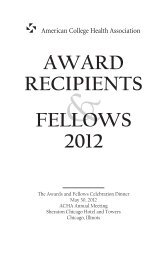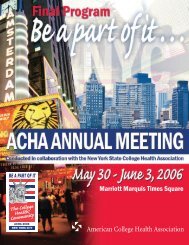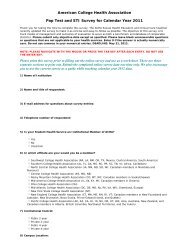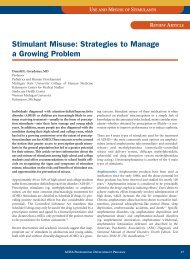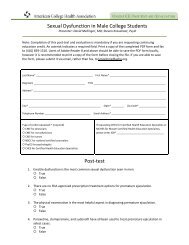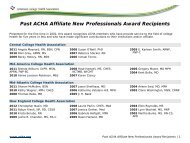final program 2005.qxp - American College Health Association
final program 2005.qxp - American College Health Association
final program 2005.qxp - American College Health Association
You also want an ePaper? Increase the reach of your titles
YUMPU automatically turns print PDFs into web optimized ePapers that Google loves.
Friday, June 3, 2005<br />
Schedule of Programs and Events<br />
<br />
8:00 AM - 9:30 AM (cont.) 83 FR109. Selecting and<br />
3. Identify healthy and permissible strategies<br />
to meet student-athletes’ need to<br />
Implementing an Electronic Medical<br />
enhance performance.<br />
Record in a University <strong>Health</strong> Setting<br />
Presider: Lisa Martin, RN, NCSN (Rogers State<br />
University)<br />
Facilitator: Rita Koett, MSN, FNP (Point Loma<br />
Nazarene University<br />
81 FR015. Estimated Blood Alchol<br />
Concentration Correlation with Negative<br />
Consequences Among <strong>College</strong> Students<br />
CME: 1.5 CH: 1.8 CECH: 1.5 PsyCE: 1.5<br />
AAFP-P: 1.5 PhCE: 0<br />
Room: Pacific Salon 6 & 7<br />
The attendee should be able to:<br />
1. Identify correlations between the eBAC<br />
and negative consequences among college<br />
students using alcohol.<br />
2. Identify the usefulness of eBAC in<br />
clinical interventions for alcohol abuse.<br />
3. Identify the usefulness of eBAC in<br />
health education interventions.<br />
Presenters: James C.Turner, MD, and Jennifer<br />
Bauerle, PhD (University of Virginia)<br />
Presider: Deborah Mathis, MSN, CRNP (University<br />
of Pennsylvania)<br />
Facilitator: Linda Bruce, MSN, NPC (Syracuse<br />
University)<br />
82 FR047. Mental <strong>Health</strong> Ethical<br />
Clinical Practice and Decisions Unique to<br />
<strong>College</strong> <strong>Health</strong> — or Treatment<br />
Interruptus<br />
CME: 1.5 CH: 1.8 CECH: 0 PsyCE: 1.5<br />
AAFP-P: 1.5 PhCE: 0<br />
Room: Royal Palm 3 & 4<br />
The attendee should be able to:<br />
1. Describe several ways to handle necessary<br />
medication continuation during<br />
vacation, summers, or extended leaves.<br />
2. Explain two referral options upon<br />
graduation.<br />
3. Explain one way to handle both voluntary<br />
and involuntary leaves of absence.<br />
4. Describe one way to handle course<br />
drops for medical reasons and one<br />
faculty argument against this.<br />
5. Discuss the ethical conflict in handling<br />
mandated evaluations.<br />
Presenters: R. Christa Eckert, MD, MPH, Kimberly<br />
D. Crowley, MSW, LCSW, MPH, and Randall M.<br />
Graf, PhD (Tulane University); Ronald Elson, MD,<br />
MPH (University of California-Berkeley)<br />
Presider:Alan Barnes, MDCM (University of<br />
Florida-Gainesville)<br />
Facilitator: Kimberly Crowley, LCSW, MPH (Tulane<br />
University)<br />
SCHEDULE OF PROGRAMS AND EVENTS<br />
CME: 1.5 CH: 1.8 CECH: 1.5 PsyCE: 1.5<br />
AAFP-P: 1.5 PhCE: 1.5 contact hours (<strong>program</strong> no. 067-<br />
999-05-024-L04)<br />
Room: Pacific Salon1<br />
The attendee should be able to:<br />
1. Identify the processes of how to select<br />
and implement an EMR.<br />
2. Describe methodology most capable of<br />
assuring staff receptivity to an EMR.<br />
3. List the advantages and disadvantages of<br />
using an EMR.<br />
Presenters: Doris Guanowsky, MPA (Pennsylvania<br />
State University)<br />
Facilitator: Sharon Roberson (University of Texas-<br />
Austin)<br />
84 FR117. Co-Occurring Disorders<br />
Assessment and Treatment: Identifying<br />
Best Practices for <strong>College</strong> <strong>Health</strong><br />
CME: 1.5 CH: 1.8 CECH: 0 PsyCE: 1.5<br />
AAFP-P: 1.5 PhCE: 0<br />
Room: Sunset<br />
The attendee should be able to:<br />
1. Discuss prevalance of co-occurring<br />
disorders and how these disorders<br />
present in college clients upon intake.<br />
2. Explain how a multi-disciplinary<br />
approach to treatment can improve<br />
prognosis by describing case studies.<br />
3. Discuss best practices in treating<br />
co-occurring disorders.<br />
Presenters: Lisa A. Laitman, MSEd, LCADC, and<br />
Najmi M. Shaikh, MD (Rutgers University);William<br />
J. Reidy, Jr., MSW, MDiv (SAMHSA’s Co-Occurring<br />
Center for Excellence)<br />
Presider: Keith J.Anderson, PhD (Rensselaer<br />
Polytechnic Institute)<br />
Facilitator: Greg Eells, PhD (Cornell University)<br />
85 FR134. Dietary Supplements and<br />
the NCAA: What Student-Athletes Need<br />
To Know<br />
CME: 1.5 CH: 1.8 CECH: 0 PsyCE: 0<br />
AAFP-P: 1.5 PhCE: 0<br />
Room: Hampton<br />
The attendee should be able to:<br />
1. Identify 2005 research data regarding<br />
collegiate athlete supplement use.<br />
2. Identify health and safety concerns and<br />
NCAA regulations regarding dietary<br />
supplement use by collegiate studentathletes.<br />
Page 44<br />
Presenters: Mary E.Wilfert, MEd, CHES (National<br />
Collegiate Athletic <strong>Association</strong>); Rachel C. Olander<br />
(National Center for Drug Free Sport)<br />
Presider: Scott Spear, MD (University of Wisconsin-<br />
Madison)<br />
Facilitator: Lindsey Eades (Virginia Commonwealth<br />
University)<br />
86 FR149. Blending Mental <strong>Health</strong><br />
and Student <strong>Health</strong>: One Experience in<br />
Integration<br />
CME: 1.5 CH: 1.8 CECH: 1.5 PsyCE: 1.5<br />
AAFP-P: 1.5 PhCE: 0<br />
Room: Pacific Salon 4 & 5<br />
The attendee should be able to:<br />
1. Describe one process for combining<br />
mental health and student health<br />
services into an integrated holistic<br />
center in a single facility.<br />
2. Describe an approach used by one<br />
student health service to prioritize<br />
<strong>program</strong>ming based on core values<br />
articulated by the staff of a mental<br />
health and student health service.<br />
3. Identify key components of a successful<br />
process to develop consensus among a<br />
disparate group of professionals delivering<br />
care to students.<br />
Presenters: Kathleen McAuliffe, MD, MPH, and<br />
Layton Borkan, LCSW (Portland State University)<br />
Presider: Mary Ross, RN (Santa Barbara<br />
Community <strong>College</strong>)<br />
Facilitator: Steve Stride, PhD (Point Loma<br />
Nazarene University)<br />
87 FR158. Preparing for a Public<br />
<strong>Health</strong> Emergency: Campus and<br />
Community Working Together<br />
CME: 1.5 CH: 1.8 CECH: 1.5 PsyCE: 1.5<br />
AAFP-P: 1.5 PhCE: 0<br />
Room: Garden Salon 1<br />
The attendee should be able to:<br />
1. Identify the mechanisms involved in<br />
organizing a public health emergency<br />
response team in both a “college town”<br />
and an “urban university”setting.<br />
2. Describe how the public health<br />
response team interacts with existing<br />
community and university emergency<br />
preparedness teams.<br />
3. Discuss two table-top exercises that<br />
public health response teams have<br />
used to prepare for a public health<br />
emergency.



![Final Program [5.4MB pdf] - American College Health Association](https://img.yumpu.com/49022356/1/190x245/final-program-54mb-pdf-american-college-health-association.jpg?quality=85)




